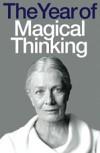The Year of Magical Thinking
For most people, the death of a relative or close friend is a bewildering experience that conjures up a huge range of emotions which only time seems to be able to heal. And since death is almost a taboo subject, there's little help on offer particularly once immediate events, such as the funeral, are over. Many people have to deal with their feelings of loss, anger and guilt on their own and in the best way they can.
'The Year of Magical Thinking' is one woman's immensely honest examination of her feelings and reactions after the sudden death of her husband which was followed shortly afterwards by the death of her daughter. It's a story made even more poignant because of the double dose of tragedy that fate doled out to her.
Vanessa Redgrave gives a sensitive and compelling performance as writer Joan Didion whose husband John Dunne and daughter Quintana died within 18 months of each other.
Watching Redgrave in this one-woman show reminded me how much I admire actors who can learn almost 2 hours of lines and deliver them flawlessly night after night. Interestingly, only a year or two ago I saw Vanessa Redgrave's brother, Corin, in a one-man show that lasted almost as long. It's quite a gift to have that kind of memory, discipline and skill.
Though I welcome the decision to tackle this unpopular subject and the bravery of the author in writing about her experiences, there are 2 fundamental problems with the play itself. First, it's a retrospective examination of coping with death. When the play starts, Didion is looking back some time after she has begun to accept and come to terms with her loss. Though this helps to clarify what happened to her, it's a more analytical rather than an emotional discussion. Redgrave does get close to breaking down at key points, and has to wipe tears from her eyes on at least one occasion, but in general she is calm and largely composed. In effect, we're getting a kind of second-hand experience rather than seeing something being played out in real-time, or in flashbacks, which we can draw conclusions about for ourselves.
The second problem lies with the affluence of the family and the repeated references to it. Of course, death is an issue which affects us all no matter which class we belong to or the state of our bank balance. But the regular references in the script to things such as the cost of medicine, visits abroad, coast-to-coast flights, swanky Hollywood hotels and such began to distract from the basic subject matter, and left me wondering quite what that all meant. After thinking about it a lot, I'm still not sure.
'The Year of Magical Thinking' is an intimate piece which I don't think is suited to a large theatre such as the Lyttleton. What the play and the subject matter really need is a much smaller venue where the audience and actor can be closer in physical terms in order to be closer on an emotional level. Though Redgrave employs all her armoury of acting skills to cope with the size of the theatre, there's an almost tangible sense that it's a struggle she can never win.
It's always a treat to see Vanessa Redgrave in live theatre. The charisma and presence we've come to relish from her stage and film performances are as much in evidence here as ever as she switches effortlessly beween anger, guilt, rage and finally acceptance. And there's no doubt that she's on fine form. But exceptional form? No. Not quite. In part, that's my response as one who admires Redgrave's work and is always looking for something more special from her performances - such is the lot of a great actress, you can never satisfy. Even so, Redgrave's performance as Joan Didion is immensely compelling and definitely worth a visit.
(Peter Brown)
What the popular press had to say.....
NICHOLAS DE JONGH for THE EVENING STANDARD says, "Static, listless production." PAUL TAYLOR for THE INDEPENDENT says, "I found the play an oddly unaffecting experience." MICHAEL BILLINGTON for THE GUARDIAN says, "For all the brilliance of Vanessa Redgrave's performance and the sensitivity of David Hare's production, I was less emotionally pulverised than I had expected." CHARLES SPENCER for THE DAILY TELEGRAPH says, "A simple, deeply felt production." BENEDICT NIGHTINGALE for THE TIMES says, "No actress can be more emotionally true. So Redgrave proves."
External links to full reviews from popular press
Independent
Guardian
The Times
Daily Telegraph
Originally published on
